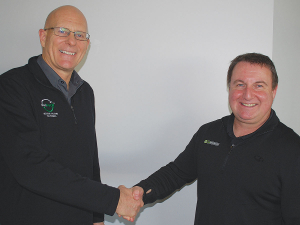Government approves nationwide recycling scheme for primary sector plastics
Rural recycling scheme Agrecovery is welcoming the Government's approval of regulations for a nationwide rural recycling scheme for agrichemicals and farm plastics.
 Agrecovery chief executive Tony Wilson (right) and Plasback commercial manager Neal Shaw celebrate the deal.
Agrecovery chief executive Tony Wilson (right) and Plasback commercial manager Neal Shaw celebrate the deal.
The two main plastic collection programmes in New Zealand's primary sector - Agrecovery and Plasback - have agreed to work together.
The two organisations have signed a memorandum of understanding, joining forces to provide the most efficient and cost-effective means to collect and recycle used farm plastic.
Agrecovery chief executive Tony Wilson says the focus is on finding the best ways to meet the needs of primary producers.
"Agrecovery and Plasback have different and complementary strengths and areas of expertise. By working together we will target our future investments to take farm plastic recycling to the next level."
Both companies have been collecting and facilitating the recycling of farm plastic in New Zealand for more than 15 years. Both are accredited voluntary product stewardship schemes under the Waste Minimisation Act.
Plasback commercial manager Neal Shaw says his company has developed an on-farm collection service for silage wrap and pit covers, while Agrecovery has established a nation-wide drop-off service to recycle agrichemical containers and large drum.
"Now our aim is to develop a service that can collect all agricultural and horticultural plastics for recycling.
"Tony and I both get calls every day from farmers and growers who want to do the right thing with their used plastic. Going forward, we will work together to take that problem off their hands," Shaw says.
The two organisations have made the decision to cooperate at a time when the Government has announced its intention to establish a mandatory, industry-wide product stewardship scheme for farm plastics. The anticipated go-live date for the regulated scheme is July 2024.
The proposed product stewardship scheme will include an up-front stewardship fee on designated farm plastic products, including packaging. A wider scheme for consumer goods packaging is also being designed.
Agrecovery and Plasback are working with the Ministry to come up with a scheme that costs industry as little as possible but is still comprehensive enough to collect, process and ship all used farm plastics to domestic and overseas recyclers.
Currently farmers and growers must deal with some plastics that they can neither drop off nor have collected. Shaw says this is because the businesses that supply those products are not contributing to the cost of recycling.
"Some companies are working with Plasback and Agrecovery to cover the costs of disposing of their waste responsibly, but others are not. The door is open to everyone in the industry to work with us to improve the service we provide primary producers," he says.
"Ultimately it is New Zealand agriculture as a whole that will benefit from responsible product stewardship. If Kiwi farmers and growers are to attract top dollar for their commodities in the global economy, they will have to prove they farm sustainably."
Early forecasts for New Zealand's apples and pears point to a standout season marked by exceptional fruit quality and high pack-out rates.
Tickets are now available for Beef + Lamb New Zealand’s (B+LNZ) Out the Gate, returning from 19-21 May 2026 at Te Pae, Christchurch.
Dairy Women's Network (DWN) is welcoming AgriHealth as a new partner.
Northland Field Days patron Ross Newlove remembers the inaugural field days he attended 40 years ago.
Southland farmer Murray Donald has been appointed as chair of Safer Farms, the industry-led organisation focused on reducing harm, injuries and fatalities in the agricultural sector.
National Lamb Day returns this Sunday, 15 February, with Beef + Lamb New Zealand Inc calling on Kiwis to fire up their barbecues and celebrate the people and the product that put New Zealand on the world map.
OPINION: Fonterra may be on the verge of selling its consumer business in New Zealand, but the co-operative is not…
OPINION: What does the birth rate in China have to do with stock trading? Just ask a2 Milk Company.